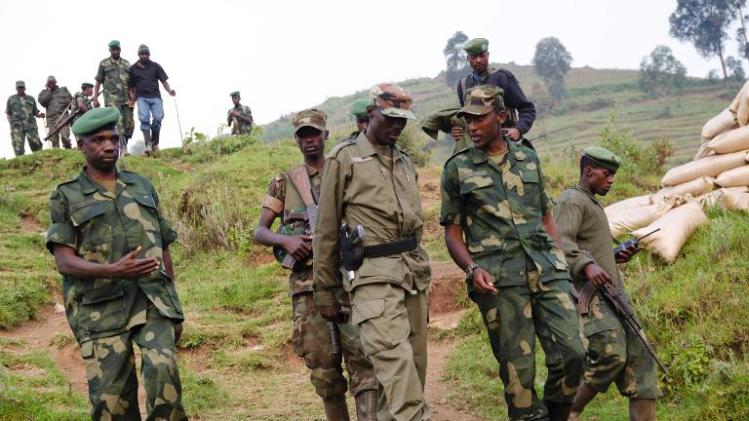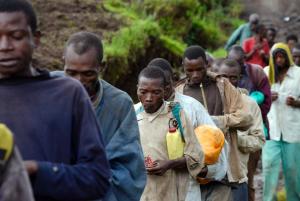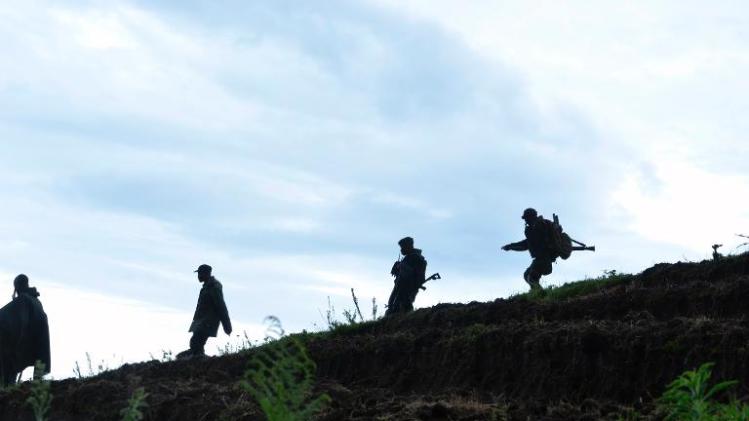DR Congo, M23 rebels 'to sign peace deal Monday'

Kampala (AFP) - The government of the Democratic Republic of Congo and the defeated M23 rebels will Monday sign a peace deal, Uganda said, adding that it will not send the fleeing insurgents back across the border.
The M23 on Tuesday ended its 18-month insurgency after a resounding defeat at the hands of the armed forces of the Democratic Republic of Congo.
Since then the majority of its fighters have fled across the border into Uganda.
"The agreement is ready and we are expecting everybody to return Monday to sign it," Ugandan government spokesman Ofwono Opondo told AFP of the deal.
"The agreement will detail how each case will be handled. There are those that are under US and UN sanctions, those who want to be reintegrated in the army, and those who simply want to go home," Opondo said.
The peace talks, which started in December, had made little headway until the DRC army started to get the upper hand militarily in recent weeks.
One of the major stumbling blocks had been the fate of around 100 M23 officers who have taken part in a series of rebellions over the past 15 years and that Kinshasa did not want to see reincorporated into its army.
Opondo said that the United Nations and the African Union, which backed the peace process, would attend Monday's ceremony.
He also confirmed that the military chief of the March 23 Movement, a group formed 18 months ago, and which both Rwanda and Uganda have been accused of backing, is on Ugandan terrirtory.
"Yes, Sultani Makenga is with us," he told AFP, refusing to reveal the rebel chief's whereabouts.
Uganda will not hand over M23 rebels who fled after being defeated, the spokesman for the army and the defence ministry said.
"They are not prisoners; they are soldiers running away from a war so we are receiving them and helping them because it is our responsibility," Colonel Paddy Ankunda told AFP, adding that Uganda had also welcomed fleeing soldiers from the DRC's national army earlier in the year.
Ugandan officers said Thursday that some 1,500 M23 insurgents had crossed over and surrendered.
"They will not be handed over to DRC," Ankunda said.
He said that fighters who refused to return home after the peace agreement would be handed over to the UN refugee agency, who would screen them and decide if they were eligible for refugee status.
"The government security forces screen the rebels when they cross the border and ... make sure they are not mixing with civilian refugees," Lucy Beck, a spokeswoman for the UN refugee agency told AFP from southwestern Uganda, where the fleeing rebels have taken refuge.
Beck said the border area was calm Friday morning.
Some 8,600 civilian refugees were still at the UN transit centre, but another 1,000 were walking or hiring trucks back to DR Congo.
"We should have far fewer refugees in the transit centre by the end of the day," she said. "A lot of them come from close by and we expect a majority will return."
"UNHCR is not considering repatriation of the refugees as it is not considered safe, even without M23," Beck went on, citing the myriad of other armed groups operating in the east of the DR Congo.
She said the agency was still hosting some 20,000 civilian refugees from DR Congo who fled earlier this year and that the majority of those had fled armed groups other than the M23.
A further 95 men from the M23, all wounded, sought refuge in neighbouring Rwanda, where they are receiving medical treatment, according to the local Red Cross.
Analysts have cast doubt on the figure of 1,500, saying that the entire M23 force numbered only around 1,000 men at the end of October.
They have suggested that the figure given by Uganda may include insurgents' family members.
The M23 on Tuesday ended its 18-month insurgency after a resounding defeat at the hands of the armed forces of the Democratic Republic of Congo.
Since then the majority of its fighters have fled across the border into Uganda.
"The agreement is ready and we are expecting everybody to return Monday to sign it," Ugandan government spokesman Ofwono Opondo told AFP of the deal.
"The agreement will detail how each case will be handled. There are those that are under US and UN sanctions, those who want to be reintegrated in the army, and those who simply want to go home," Opondo said.
The peace talks, which started in December, had made little headway until the DRC army started to get the upper hand militarily in recent weeks.
One of the major stumbling blocks had been the fate of around 100 M23 officers who have taken part in a series of rebellions over the past 15 years and that Kinshasa did not want to see reincorporated into its army.
Opondo said that the United Nations and the African Union, which backed the peace process, would attend Monday's ceremony.
He also confirmed that the military chief of the March 23 Movement, a group formed 18 months ago, and which both Rwanda and Uganda have been accused of backing, is on Ugandan terrirtory.
"Yes, Sultani Makenga is with us," he told AFP, refusing to reveal the rebel chief's whereabouts.
Uganda will not hand over M23 rebels who fled after being defeated, the spokesman for the army and the defence ministry said.
"They are not prisoners; they are soldiers running away from a war so we are receiving them and helping them because it is our responsibility," Colonel Paddy Ankunda told AFP, adding that Uganda had also welcomed fleeing soldiers from the DRC's national army earlier in the year.
Ugandan officers said Thursday that some 1,500 M23 insurgents had crossed over and surrendered.
"They will not be handed over to DRC," Ankunda said.
He said that fighters who refused to return home after the peace agreement would be handed over to the UN refugee agency, who would screen them and decide if they were eligible for refugee status.
"The government security forces screen the rebels when they cross the border and ... make sure they are not mixing with civilian refugees," Lucy Beck, a spokeswoman for the UN refugee agency told AFP from southwestern Uganda, where the fleeing rebels have taken refuge.
Beck said the border area was calm Friday morning.
Some 8,600 civilian refugees were still at the UN transit centre, but another 1,000 were walking or hiring trucks back to DR Congo.
"We should have far fewer refugees in the transit centre by the end of the day," she said. "A lot of them come from close by and we expect a majority will return."
"UNHCR is not considering repatriation of the refugees as it is not considered safe, even without M23," Beck went on, citing the myriad of other armed groups operating in the east of the DR Congo.
She said the agency was still hosting some 20,000 civilian refugees from DR Congo who fled earlier this year and that the majority of those had fled armed groups other than the M23.
A further 95 men from the M23, all wounded, sought refuge in neighbouring Rwanda, where they are receiving medical treatment, according to the local Red Cross.
Analysts have cast doubt on the figure of 1,500, saying that the entire M23 force numbered only around 1,000 men at the end of October.
They have suggested that the figure given by Uganda may include insurgents' family members.
Uganda won't hand fleeing M23 rebels to DR Congo
US pressure on Rwanda key to ending DR Congo rebellion
Boys hold a placard supporting Democratic Republic of Congo's FARDC regular army during a demonstration organised by the Nyiragongo civil society in Kibumba on November 7, 2013 (AFP Photo/Junior D. Kannah)
Washington (AFP) - The United States exerted key pressure on Rwanda to halt its support for M23 rebels in the Democratic Republic of Congo, seeking to end the latest conflict in the Great Lakes region of Africa.
An offensive this week by Congolese soldiers backed by UN troops defeated the M23 rebels, who launched an uprising in the mineral-rich east of the country in early 2012.
Washington had already put its ally Rwanda on notice in July 2012, freezing annual military assistance of $200,000.
Then, a month ago, Washington announced sanctions concerning the training of Rwandan officers.
The goal was to get the government of President Paul Kagame to break completely with the Tutsi mutineers of the M23.
"It is clear that the US has been behind the scene putting more pressure on Rwanda," said Richard Downie of Washington's Center for Strategic and International Studies (CSIS).
He cited as evidence "the assistance over the border from Rwanda which was pretty significant until farly recently has trickled down to virtually nothing in the past few weeks."
Kagame took power after the 1994 genocide committed by Hutu extremists, and the United States has supported his Tutsi-led government for nearly 20 years.
But now, Downie said, Washington has "very slowly, but increasingly come around to the view that Rwanda is the critical piece of trying to resolve this chronic conflict and that Rwanda's role has been frankly very unhelpful."
After long keeping quiet, in recent months Washington embraced reports from the United Nations and claims from DR Congo accusing Rwanda and Uganda of providing military support to the M23 in the North Kivu region. Both countries deny this.
The US special envoy for the Great Lakes region, Russ Feingold, a former senator and expert in the region, recalled Wednesday that the sanctions imposed last month were motivated by "the recruitment or assistance in terms of children soldiers for the M23 and involvement of Rwanda in that."
But the punishment could be lifted if it is shown that Kigali has in fact broken ties with the rebels, Feingold said.
A foreign policy priority for Obama
Feingold did not hide the fact that the withdral of Rwandan support for the M23 was due in part to behind the scenes work by American diplomats, in particular to phone calls from Secretary of State John Kerry to Kagame and other leaders in the region.
Without confirming the date of the last conversation between Kerry and Kagame, a State Department official told AFP: "Secretary Kerry and other officials have regularly raised our concerns about support for armed groups such as M23 with various leaders in the region, including President Kagame."
Feingold said the level of US engagement in the region is "probably unprecedented," adding it is one of the first priorities of President Barack Obama's foreign policy.
Feingold noted his own full time appointment to his post in July -- which came at the request of UN counterpart Mary Robinson and EU counterpart Koen Vervaeke -- and the strong involvement of the United States in efforts to conclude regional peace talks underway in Kampala, Uganda for the past 11 months.
After 20 years of war in the region that have left five to six million dead, according to US estimates, Downie agreed with Feingold that "the US is driven really by an humanitarian agenda in the Congo and the genuine desire to try to tackle this conflict."
But, he cautioned, "this a chronic long-running conflict, although we have a moment of optimism right now with M23 disbanding, this is by no means the end of the road in terms of solving these problems."
An offensive this week by Congolese soldiers backed by UN troops defeated the M23 rebels, who launched an uprising in the mineral-rich east of the country in early 2012.
Washington had already put its ally Rwanda on notice in July 2012, freezing annual military assistance of $200,000.
Then, a month ago, Washington announced sanctions concerning the training of Rwandan officers.
The goal was to get the government of President Paul Kagame to break completely with the Tutsi mutineers of the M23.
"It is clear that the US has been behind the scene putting more pressure on Rwanda," said Richard Downie of Washington's Center for Strategic and International Studies (CSIS).
He cited as evidence "the assistance over the border from Rwanda which was pretty significant until farly recently has trickled down to virtually nothing in the past few weeks."
Kagame took power after the 1994 genocide committed by Hutu extremists, and the United States has supported his Tutsi-led government for nearly 20 years.
But now, Downie said, Washington has "very slowly, but increasingly come around to the view that Rwanda is the critical piece of trying to resolve this chronic conflict and that Rwanda's role has been frankly very unhelpful."
After long keeping quiet, in recent months Washington embraced reports from the United Nations and claims from DR Congo accusing Rwanda and Uganda of providing military support to the M23 in the North Kivu region. Both countries deny this.
The US special envoy for the Great Lakes region, Russ Feingold, a former senator and expert in the region, recalled Wednesday that the sanctions imposed last month were motivated by "the recruitment or assistance in terms of children soldiers for the M23 and involvement of Rwanda in that."
But the punishment could be lifted if it is shown that Kigali has in fact broken ties with the rebels, Feingold said.
A foreign policy priority for Obama
Feingold did not hide the fact that the withdral of Rwandan support for the M23 was due in part to behind the scenes work by American diplomats, in particular to phone calls from Secretary of State John Kerry to Kagame and other leaders in the region.
Without confirming the date of the last conversation between Kerry and Kagame, a State Department official told AFP: "Secretary Kerry and other officials have regularly raised our concerns about support for armed groups such as M23 with various leaders in the region, including President Kagame."
Feingold said the level of US engagement in the region is "probably unprecedented," adding it is one of the first priorities of President Barack Obama's foreign policy.
Feingold noted his own full time appointment to his post in July -- which came at the request of UN counterpart Mary Robinson and EU counterpart Koen Vervaeke -- and the strong involvement of the United States in efforts to conclude regional peace talks underway in Kampala, Uganda for the past 11 months.
After 20 years of war in the region that have left five to six million dead, according to US estimates, Downie agreed with Feingold that "the US is driven really by an humanitarian agenda in the Congo and the genuine desire to try to tackle this conflict."
But, he cautioned, "this a chronic long-running conflict, although we have a moment of optimism right now with M23 disbanding, this is by no means the end of the road in terms of solving these problems."
COMMENTS:
Mbanda
As long as these fake people posing as special advisers/envoys dine with genocide perpetrators and all sorts of terrorists, there will never be even a resemblance of peace in that part of the world. I wonder why lessons are not drawn from Iraq, Afghanistan, Libya and Syria.
mark
Blacks on dope ain't got no hope.


